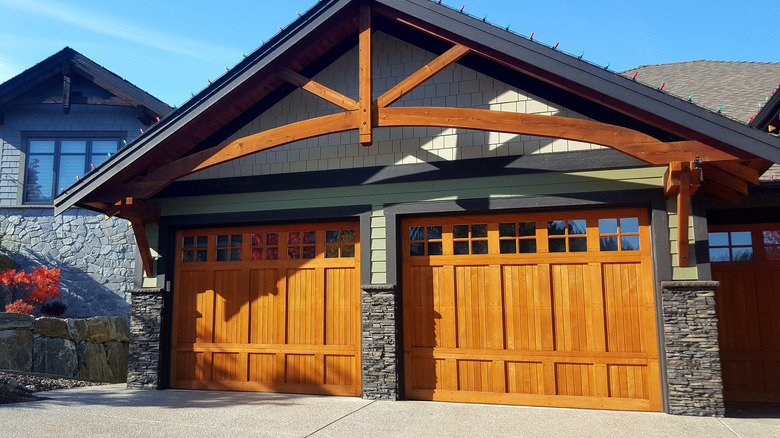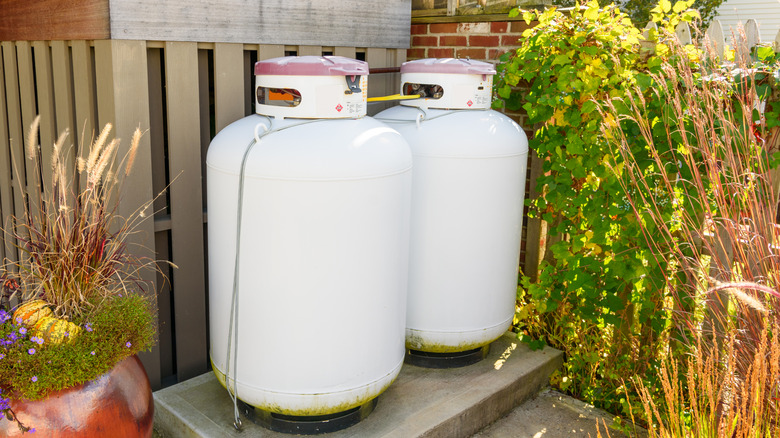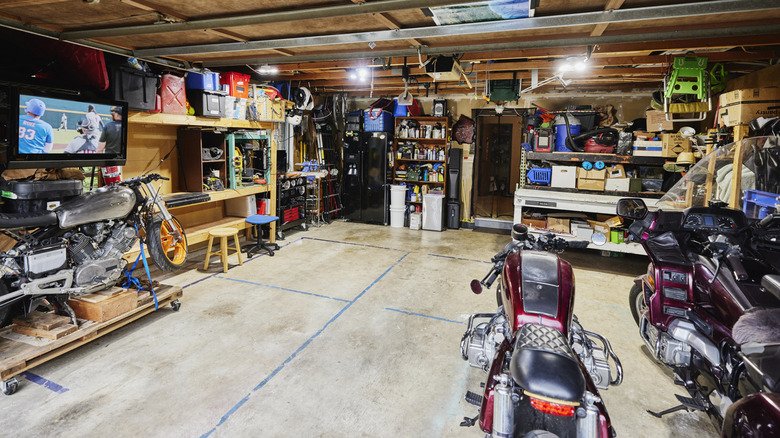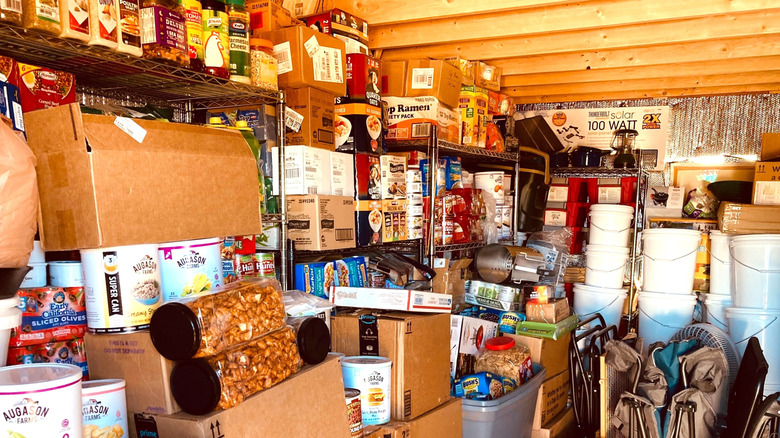5 Things You Should Never Store In Your Garage Or Shed
For the modern homeowner, garages and sheds are some of the most flexible parts of our homes. After all, they can be used for so many different things, like woodworking projects, your horde of power tools, and of course, keeping and maintaining your everyday vehicle. Because of this, it's important to organize our garages to suit our needs, which helps make sure we stay on top of the little maintenance requirements. However, it's important to note that there are probably a few things that deserve to live elsewhere in your home. Typically, these are the items that are sensitive to things like temperature changes, exposure to the elements, or even insects.
That said, there are a ton of factors that affect what should and shouldn't be stored in your garage or shed. For example, where your home is located can affect things like standard ambient temperatures, humidity, or proximity to wildlife. In addition, you'll want to take into consideration if you've insulated your garage door the right way or the type of materials your shed is made from. Lastly, how you use your garage will affect the kind of exposure its contents will have to things like dust or moisture, as well as if you plan to use it for a single or multiple purposes. While you'll need to take our advice with a grain of salt, there are some universal things to watch out for, as well as some possible solutions if you have no other storage alternative.
Propane tanks
For people who spend a lot of time outdoors, propane tanks are like the gifts that keep on giving. Whether it's to help fuel your outdoor grill, create a warm space in your patio, or even work during electricity outages, it's a practical addition to your home. In addition, propane tanks play an important role in being able to use fire pits during a fire ban. That said, since it's made to generate heat, it's not surprising that you should be careful with how you store large tanks, which ideally should not be inside your garage or shed. In general, FerrellGas recommends storing your propane tanks outdoors, upright, and away from direct sunlight.
In the same vein, AmeriGas points out that propane can also lead to combustion if exposed to extreme temperatures. For this reason, it suggests keeping it at least 10 ft away from anything flammable. If you have no other choice but to keep your propane tank in your garage or shed, AmeriGas states that the structure should not be connected to your home. In addition, it lists a few precautions, such as staying between −40 °F and 120 °F and not keeping it inside any vehicle. Because it could lead to issues like carbon monoxide poisoning, the company also reiterates that you're not supposed to use anything rated to be an outdoor propane appliance inside any part of your home. Should you suspect any leaks, it's best to call for an inspection.
Sensitive electronics and batteries
When it comes to electronics, every single device has its designated operating and storage temperature ratings. For photographers, you might already know that proper storage for your photography gear is important because cameras and lenses can be sensitive to dust and humidity. And if you have any spare LCD TVs lying around, Orient Display shares that you'll want to keep it between -4°F to 140°F if you don't want problems with the display quality. For part-time content creators, Simple Home Cinema recommends storing AV equipment in places with a maximum temperature of 86°F to keep them working for longer.
In the past, we've also mentioned before the dangers of leaving tool batteries in hot environments, which span from minor issues like capacity loss to more serious concerns, like catching fire. On the other hand, you'll also want to store your power tool batteries properly during the winter season. For example, you might be placing it near heat-generating devices like space heaters, which can trigger similar issues. That said, it's completely normal for you to want to keep your batteries where you store your tools. But if you want to keep these problems from happening, it is possible to both invest in climate-controlled boxes and be mindful of where you place your tool batteries inside your garage. It's also a good idea to routinely inspect your batteries for any issues, keep them clean, and dispose of them properly if they're no longer operating perfectly.
Paper and media products
In the modern world, many of us store important documents through cloud storage options, like Google Drive, Dropbox, iCloud, or OneDrive. However, one of the rules of keeping important documents safe is to make sure they're stored on multiple platforms, including offline. However, not everyone has a space in their home to store a ton of physical documents, so many of them often find themselves in our garages. In the same vein, it's also where other paper-based items, like books or magazines, tend to end up. Unfortunately, our garages aren't always the best place for paper products, especially since water or humidity can do a lot of damage to them, such as mold. This doesn't even take into consideration the possibility of insects munching on it as well. In fact, the British Library mentions that many insects, like beetles or termites, are attracted to everything from the glue used to bind books together, as well as the paper itself.
Should there be no other place in your home to keep mountains of documents, you can opt to invest in storage solutions that are meant to protect them. For example, we've shared before how the Harbor Freight Apache cases, which are waterproof, dustproof, and bugproof, are a great way to protect family memorabilia like photos, letters, land titles, or VHS tapes. Plus, there are also several gadgets you can buy to keep the bugs at bay at home, like ultrasonic pest repellers, electric fly swatters, and salt guns.
Wine and other liquor
In an ideal world, wine lovers will have their own cellars tucked under their homes. But for many casual drinkers who keep a few bottles, it's not uncommon to keep a bottle or ten elsewhere. Should your collection be big enough, some of them may find their way into your garage, wherein they may not be best suited for long-term storage. Wineware cautions that too much vibration can lead to wine spoiling, which can be a problem if you work with a lot of power tools. Additionally, it also said that it's best to stay under 70% humidity or risk mold. As for other types of liquor, the Old Tennessee Distilling Co. mentions that ideally, you keep your liquor around 57.5 degrees Fahrenheit on average. Plus, the company also cautions how humidity can affect a number of things, like the seal of bottle caps and cork.
However, this doesn't mean you should let go of your dream wine collection just yet, since you can get standalone small wine cellars. For fans of Hi-Sense's television sets, you'd be surprised to know that they also sell both 46 and 54-bottle wine coolers, which are designed to keep wines at the optimal temperature even in your garage. These days, you can even get smart ones with nifty features like voice control, like the LG Signature Smart Wine Cellar. And if you want to keep the labels and caps intact, you can invest in a good humidifier brand for your garage as well.
Sensitive food products
As with every person concerned with emergency preparedness, keeping a stash of food for your household is one of the basic things on your list. Most people will already know that you should opt for food items that not only have a long shelf life, but aren't so sensitive to fluctuating temperatures, especially if you're going to store them in your garage. Not to mention, even reasonably durable food items, like grains, canned goods, and dry goods, have limits. For example, the University of Minnesota cautions that even canned goods can go bad if they can go bad after being left in temperatures of 75 degrees Fahrenheit for long periods. Although grains like rice can last decades when stored in oxygen-free containers, the Utah State University recommends storing them in an environment that is at most 40 degrees Fahrenheit. With this, it's important to evaluate both the type of food products you want to store, the length of time you plan to keep them, and the expected temperature fluctuations in your storage area.
But if you're convinced that your garage or shed is well-insulated enough to be under the recommended maximum temperature requirements, there's another concern that you need to manage: pests. Depending on the type of food you've stored, it may attract everything from little insects like ants to larger rodents. Thankfully, there are a lot of proven tricks to keep mice away from your garage, like deterrents, traps, and basically just keeping the place clean.





